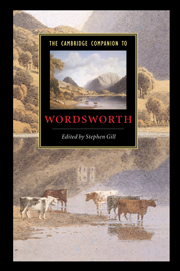Book contents
- Frontmatter
- Introduction
- 1 Wordsworth: the shape of the poetic career
- 2 Wordsworth's poetry to 1798
- 3 Poetry 1798-1807
- 4 'The noble living and the noble dead'
- 5 Wordsworth and The Recluse
- 6 Wordsworth and the meaning of taste
- 7 Wordsworth's craft
- 8 Gender and domesticity
- 9 The philosophic poet
- 10 Wordsworth and Coleridge
- 11 Wordsworth and the natural world
- 12 Politics, history, and Wordsworth's poems
- 13 Wordsworth and Romanticism
- 14 Wordsworth and America
- 15 Textual issues and a guide to further reading
- Index
- Series List
12 - Politics, history, and Wordsworth's poems
Published online by Cambridge University Press: 28 May 2006
- Frontmatter
- Introduction
- 1 Wordsworth: the shape of the poetic career
- 2 Wordsworth's poetry to 1798
- 3 Poetry 1798-1807
- 4 'The noble living and the noble dead'
- 5 Wordsworth and The Recluse
- 6 Wordsworth and the meaning of taste
- 7 Wordsworth's craft
- 8 Gender and domesticity
- 9 The philosophic poet
- 10 Wordsworth and Coleridge
- 11 Wordsworth and the natural world
- 12 Politics, history, and Wordsworth's poems
- 13 Wordsworth and Romanticism
- 14 Wordsworth and America
- 15 Textual issues and a guide to further reading
- Index
- Series List
Summary
We know more about Wordsworth than before. The Cornell Wordsworth Series and new biographies - Gill, Johnston, Barker, Wu - have enhanced understanding of the poems and the life. And there have been startling discoveries. The National Library of Scotland yielded a manuscript of Wordsworth's Imitation of Juvenal, a satire on government and aristocracy dating from 1795 which the poet had determined should be suppressed. The Public Record Office, London, disclosed correspondence between the Home Office and their agent James Walsh who in August 1797 was sent to spy on Coleridge and the Wordsworths at Nether Stowey. Wordsworth's letters to Mary Hutchinson, found in 1977 among scrap paper at Carlisle, offered unprecedented insight into their marriage. So we do know more about Wordsworth, but not all about Wordsworth. Gaps and silences in The Prelude, and the conjectured career of the 'hidden Wordsworth', now seem as significant as the documented life. Emile Legouis's pioneering Early Life of William Wordsworth, 1770-1798, first published in 1896, announced its source and subject as 'A Study of The Prelude'. One hundred years later Kenneth Johnston's The Hidden Wordsworth (1998) set out to dispel the 'Wordsworthian cover-up' by revealing how what 'seem to be metaphors' in the poetry 'often turn out to have a literal correspondence to the life'.
- Type
- Chapter
- Information
- The Cambridge Companion to Wordsworth , pp. 196 - 212Publisher: Cambridge University PressPrint publication year: 2003
- 1
- Cited by



